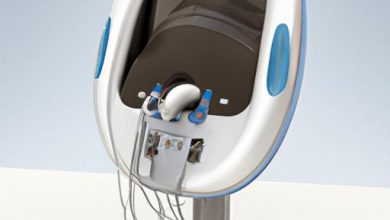7 Advantages of Working in the Healthcare Industry
Are you considering a career in healthcare? With the COVID-19 pandemic highlighting the importance of the healthcare industry, there has never been a better time to enter this field. In this article, we will explore the seven advantages of working in the healthcare industry.
Introduction

The healthcare industry encompasses a wide range of professions, from doctors and nurses to laboratory technicians and medical researchers. This field is incredibly diverse, offering a variety of career paths and opportunities for growth.
Working in healthcare can be incredibly rewarding, as healthcare professionals play a vital role in improving the lives of others. In this article, we will explore the many benefits of working in healthcare, including job security, competitive compensation, opportunities for career growth, and more.
Job Security
One of the most significant advantages of working in the healthcare industry is job security. The demand for healthcare professionals is growing rapidly, with the Bureau of Labor Statistics projecting an 18% increase in healthcare jobs by 2026. This growth is due in part to an aging population that requires more healthcare services.
In addition, the COVID-19 pandemic has highlighted the importance of healthcare workers, leading to increased funding for the industry and a greater demand for healthcare services. Healthcare jobs are essential and are unlikely to be outsourced or automated, making them an excellent choice for job security.
Furthermore, healthcare jobs are often recession-proof. During economic downturns, healthcare services remain in high demand, providing job security for healthcare professionals. Whether you are just starting your career or looking for a change, a job in healthcare can provide the stability and security you need.
Competitive Compensation
Another advantage of working in the healthcare industry is competitive compensation. Healthcare jobs often come with higher salaries and better benefits than jobs in other industries. According to the Bureau of Labor Statistics, the median annual wage for healthcare practitioners and technical occupations was $68,190 in May 2020, compared to $41,950 for all occupations.
Additionally, many healthcare jobs offer excellent benefits packages, including health insurance, retirement plans, and paid time off. These benefits can help offset the stress and long hours associated with healthcare work, making it a more attractive career choice.
With a career in healthcare, you can earn a good living while helping others. Whether you choose to work in a hospital, clinic, or research facility, the competitive compensation offered in the healthcare industry can provide financial security for you and your family.
Competitive Compensation
In addition to job security, healthcare professionals can also enjoy competitive compensation. Healthcare salaries tend to be higher than in other industries due to several factors. Firstly, healthcare jobs require significant education and training, which can be expensive and time-consuming. As a result, healthcare professionals are often compensated accordingly for their expertise and skills.
Secondly, the healthcare industry is heavily regulated, which can increase the cost of providing healthcare services. To remain competitive, healthcare providers must pay their employees a fair wage. This means that healthcare professionals are often paid more than workers in other industries.
When compared to other industries, healthcare compensation is typically higher. According to the Bureau of Labor Statistics, the median annual wage for all occupations in May 2020 was $41,950, while the median annual wage for healthcare practitioners and technical occupations was $68,190.
Opportunities for Career Growth
The healthcare industry offers a wide range of career paths and opportunities for growth. Healthcare professionals can choose to specialize in a particular area, such as pediatrics, oncology, or cardiology, or they can pursue a leadership role, such as a hospital administrator or healthcare executive.
There are many different education and training requirements for healthcare careers, from certificate programs to doctoral degrees. This means that healthcare professionals can continue to learn and grow throughout their careers, with plenty of opportunities to advance and take on new challenges.
Examples of healthcare careers with high growth potential include nurse practitioners, physician assistants, and medical and health services managers. These positions are projected to grow much faster than average, with job opportunities expected to increase by 28%, 31%, and 32%, respectively, by 2029.
Whether you are just starting your career in healthcare or looking to make a change, there are plenty of opportunities for growth and advancement. With a commitment to lifelong learning and a willingness to take on new challenges, you can build a successful and fulfilling career in healthcare.
Positive Impact on Society
Working in healthcare provides an opportunity to make a positive impact on society. Healthcare professionals play a critical role in improving public health and well-being. They help prevent and treat illnesses, develop new treatments and cures, and provide essential support to those in need.
Healthcare workers also contribute to public health initiatives, such as disease prevention and vaccination programs. These initiatives help to reduce the spread of infectious diseases and improve overall public health. For example, the development of vaccines has led to the eradication of smallpox and the near-elimination of diseases like polio and measles.
Additionally, healthcare professionals often work with underserved communities, providing essential care and support to those who may not otherwise have access to healthcare services. This work helps to reduce health disparities and improve the overall health of our society.
Job Satisfaction
Working in healthcare can be incredibly rewarding and provide a high level of job satisfaction. Healthcare professionals have the opportunity to make a positive impact on the lives of others, which can be emotionally fulfilling. This work provides a sense of purpose and meaning that can be difficult to find in other careers.
In addition to the emotional rewards, healthcare jobs often offer opportunities for growth and development. Healthcare workers can pursue additional education and training to advance their careers, taking on new challenges and responsibilities. This growth can provide a sense of accomplishment and pride in their work.
Many healthcare jobs also offer a flexible schedule, allowing workers to balance their personal and professional lives. This work-life balance can reduce stress and improve overall job satisfaction.
Some healthcare jobs, such as hospice care, offer particularly high levels of job satisfaction. Hospice workers provide end-of-life care to patients, often forming deep connections and relationships with them and their families. This work can be emotionally challenging, but also incredibly rewarding, providing a sense of comfort and support to those in their time of need.
In conclusion, working in the healthcare industry offers many advantages, including job security, competitive compensation, opportunities for career growth, and the satisfaction of making a positive impact on society. Whether you are just starting your career or looking for a change, the healthcare industry provides a variety of career paths and opportunities for personal and professional growth. At Zahnweiss Info, we are committed to providing the latest updates on healthcare news and treatments to help you live your healthiest life.




